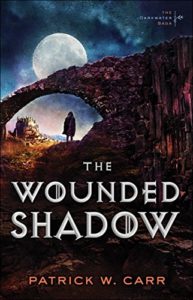Darkwater Saga 3 Patrick W Carr The Wounded Shadow
 Feelings were mixed as I opened the review copy I received from Bethany House of Darkwater Saga 3 Patrick W Carr The Wounded Shadow. Bethany has been sliding away from the faith for quite a while. I was afraid that Carr would do what he did with the amazing Cast of Stones. It turns out I was wrong. The Darkwater Saga loses touch with Truth entirely. This tale wallows in entertaining worldly wisdom, at best. Christianity lies completely outside this wonderfully complex and detailed example of world-building.
Feelings were mixed as I opened the review copy I received from Bethany House of Darkwater Saga 3 Patrick W Carr The Wounded Shadow. Bethany has been sliding away from the faith for quite a while. I was afraid that Carr would do what he did with the amazing Cast of Stones. It turns out I was wrong. The Darkwater Saga loses touch with Truth entirely. This tale wallows in entertaining worldly wisdom, at best. Christianity lies completely outside this wonderfully complex and detailed example of world-building.
[yasr_overall_rating size=”large”]
Darkwater Saga 3 Patrick W Carr The Wounded Shadow entertains
With no expectation of edification, the Saga presents fantasy entertainment with little or no redeeming merit. Patrick shows excellent writing skills and an impressive imagination—receiving more accolades than he did with The Staff and The Sword series. I don’t question the accolades. Instead, I wonder how Bethany justified publishing it.
Here’s the blurb:
The kings and queens of the northern continent lay siege to the Darkwater Forest, desperate to contain its evil. But rumors of gold and aurium have lured deserters and the desperate into its shadow, creating a growing army held in its sway. Desperate after the death and dissolution of their greatest ally, Willet and the Vigil seek the truth of what lies at the heart of the evil they face. They delve the mind of an old enemy and find an answer far worse than they could have imagined.
Danger stalks the cities of the north, striking at the rulers of the kingdoms. As Willet and the rest of the Vigil seek to find answers, the group is scattered with an ever-growing darkness around them. Will they discover a path to keep their land safe, or will an ancient evil reclaim the world it once called its own?
Bottomline? I found I didn’t care much.
[yasr_visitor_multiset setid=0]

Huh. I saw so much paraphrased scripture in there, I was astounded and delighted.
True, but no savior, no Holy Spirit, no rebirth, and much more. It wasn’t even religiously Christian, certainly not evangelical or Spirit-filled.
I thought the books were all about Christian life and divisions and differences in emphases among us. I suppose you could say that making one of the major themes being about how resentment can drive you into a dark place is not necessarily Christian, for anyone could make that observation, but I do think it’s pertinent to Christian life. God (or Aer) grants gifts as He will among the members of the body.There’s the Holy Trinity. There’s confession of sins. There’s discernment. The books are not allegories and there are few one to one correspondences between this literary motif and that particular Christian doctrine, but, repeating myself, I was delighted by the Christian flavor of the books.
I’m trying to remember the names of the Trinity Carr used in the books. If they weren’t Father, Son, and Holy Spirit, I don’t know what they were.
Ah well, as always, your perspective is interesting.